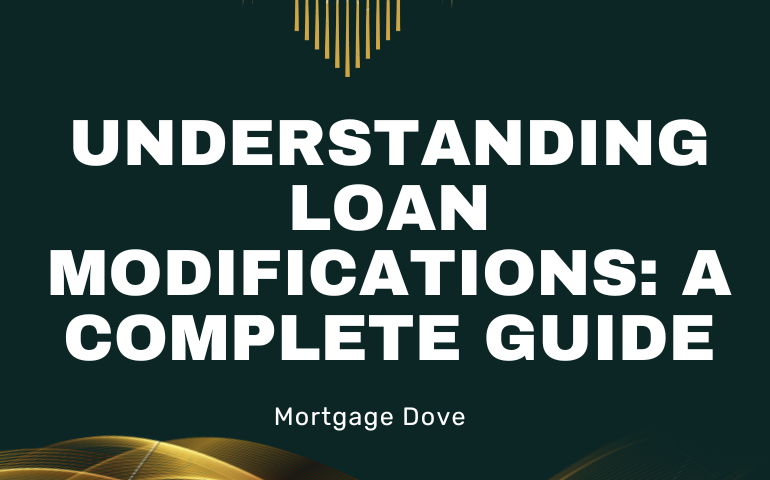
Mortgage Dove
Understanding Loan Modifications: A Complete Guide
Curious about what a loan modification is? They're different from refinancing. While refinancing means getting a new mortgage, a loan modification changes the terms of your current one. Keep in mind these changes might affect your credit score. If you're paying your mortgage on time, consider refinancing. Let's quickly examine what loan modifications involve, when they can help, and how they might affect your finances. A loan modification is when the terms of your mortgage loan get changed. It's not like refinancing, which replaces your current mortgage with a new one. Instead, it adjusts the conditions of your existing loan. It's good to understand that changing your loan plans could lower your credit score. If you're paying your mortgage regularly, check your options and see if you can apply for a refinance, as it might be a better option. You can only change your loan terms through your current lender because they must agree with the changes. Some things a modification might do include: If you're struggling with your monthly payments, you can extend the time you have to pay back your loan. This gives you more time and lowers your monthly payment. If interest rates are lower now than when you got your loan, you might change your loan to get a lower rate. This usually means you pay less each month. You could change from a loan with varying interest rates to one with a fixed rate. This helps if you need a steady monthly payment, especially if your income stays the same. Sometimes, the lender might agree to let you pay back some of the money later. This can help make your mortgage more manageable, but it's uncommon. Usually, this only happens if there's no other way to avoid losing your home. When you ask for a change in your loan terms, the lender doesn't have to agree. It's more challenging to get a modification compared to refinancing. You have to prove you're facing financial difficulties. Each lender and investor (like Fannie Mae, Freddie Mac, FHA, etc.) has its own rules for who qualifies and what changes they'll make. If you need to catch up on mortgage payments, companies might offer to help with a loan modification. They talk to your lender for you, making it easier. But remember, these companies might charge you for something your loan servicer does for free. If you choose to work with one of these companies, research them first. Avoid a pricey deal if you're already struggling with mortgage payments. If an offer sounds too good, it might not be true. Sometimes, seeking a loan modification before going for a full refinance would be wise. Here's when that might be: If you owe more on your house than its value, that's an underwater mortgage. Missing payments early on or living in an area with dropping property values can cause this. Some loans, like FHA Streamline, might let you refinance an underwater loan, but you need at least six consecutive on-time payments. Refinancing won't help you cut down on your mortgage principal. If you're at risk of foreclosure, a loan modification might be a solution. Lenders won't consider refinancing if you're behind on payments. If catching up isn't possible before applying, seeking a modification could be the way to go. Government programs exist to modify mortgage loans, which are pretty common due to the large amounts of money involved. Between 2007 and 2010, during the housing foreclosure crisis, various government initiatives were set up to assist borrowers. Although some of these programs have ended, certain borrowers still have options. These include: Additionally, some regular lenders have programs for modifying loans. Every loan company has its own rules for mortgage loan modification. Most need you to apply with papers that show you need the change. Some of these papers are: Your lender must know you don't earn enough to pay your mortgage. Proof of income can be a paper from your employer that says how much you make. Your lender will probably need your tax papers when you ask to change your loan. Your lender might want bank papers to check what money you have. A hardship letter tells your lender why you can't pay your monthly payments or the whole loan. You should also send extra papers with your letter to explain your situation more. Ask your lender how to apply if you qualify for a loan modification. Remember, they might say no. If they do, you might still be able to get a refinance. Which Loans Can Be Changed? Most often, mortgages are loans that can be modified. Your loan provider might offer specific programs for difficult times. Do I Need to Have a Lawyer for Loan Modification? Some loan companies might have their help for modifications, but having a lawyer could make the process smoother. However, having one for applying for a loan modification is not mandatory. How Can Loans Be Modified? A modification could mean lowering the interest rate, extending the loan duration, switching from a variable to a fixed rate, or moving missed payments to the end of the loan. These steps could reduce your monthly payment and make repayment easier. A loan modification might save you if you're about to lose your loan or can't make payments. Ask your lender if you qualify. Usually, lenders prefer changing your loan terms over taking your property away through foreclosure or repossession.What’s a Loan Modification?
How Does Loan Modification Work?
When Is It a Good Idea to Use a Mortgage Modification?
Government Programs for Mortgage Modifications
How to Modify Your Loan
FAQs
The Bottom Line
"Mortgage Dove makes home financing convenient for every American. You can count on us to provide a home buying experience tailored to your personal needs and financial situation. We strive to give you the peace of mind that your home financing goals can be achieved.”

Mortgage®
www.mortgagedove.com



-and-how-does-it-work.png)